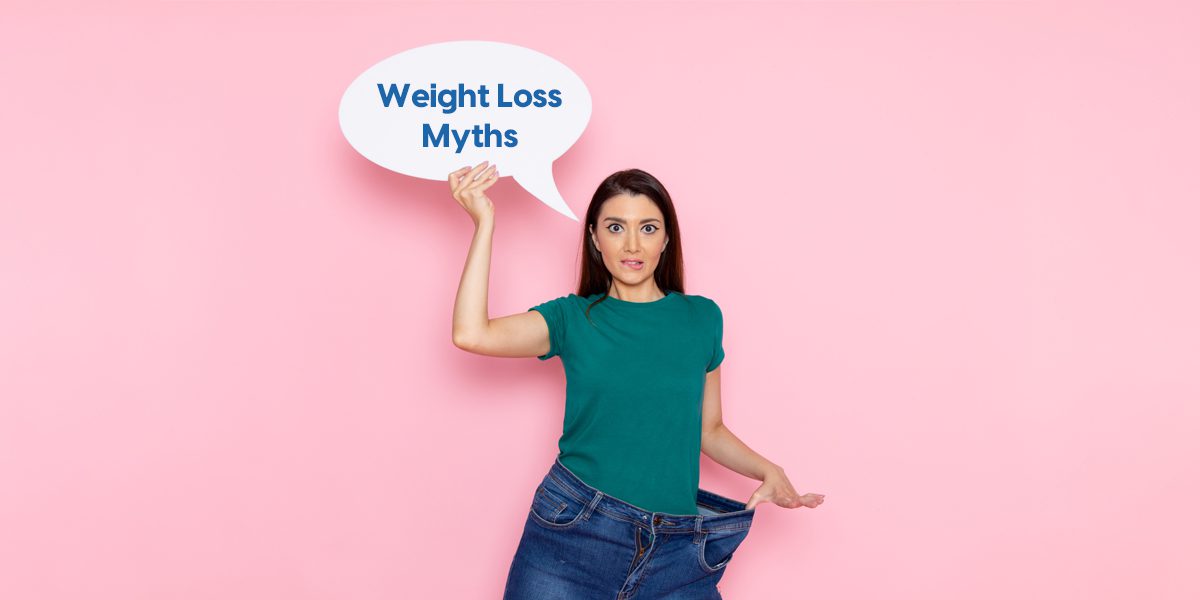The Truth Behind 8 Popular Weight Loss Myths

Are you trying to lose weight or want to manage your weight better? When you are trying to lose weight, it is often easy to get confused about what to follow and what to leave out, because of the abundance of weight loss myths that are out there.
In this article, we will try and burst out some of the most common weight loss weights that are out there and try to help you understand the truth behind some common misconceptions about weight loss.
Myths about weight loss
Weight loss myths or a myth about diet is a type of suggestion, information, or advice that is given without enough credible evidence to back it up.
Over time, as more and more people start sharing this advice or suggestion with others, without any real proof to back up the claims, these types of suggestions turn into weight loss myths.
Let’s take a look at some of the most common weight loss myths and try to find out the actual truth behind each of them.
Myth Number 1 – Cut off carbs completely so that you can lose weight
Data shows that reducing carbohydrate intake to 50% of your initial consumption is also enough. You can use the Fitterfly Wellness App to track your carb intake along with other macronutrients and micronutrients.
The fact is that there are different types of carbohydrates, especially simple carbs and complex carbs. Simple carbs are usually the type of carbs that are found in foods such as candies, processed foods, sweets, sugar, pastries, cakes, and baked food items, and usually, they do not have any health or nutritional benefits and lack other important nutrients such as vitamins, fiber, and minerals.
What to do:
- Reduce your intake of foods that contain simple carbs and instead eat foods that have complex carbs.
- Complex carbs contain more nutrients and these types of carbs take longer to get digested in your body. As a result, they will make you feel full but will not cause sudden spikes in your blood sugar levels.
- Some good examples of complex carbs foods include whole grains, fresh fruits and vegetables, brown rice, rolled oats, daliya, ragi, and so on.
Note: If you are someone who is trying to manage your diabetes, it is always better to make changes in your diet only after consulting with your doctor or your diabetes management team.
If you enroll in the Fitterfly Diabetes Management program we will map your personalized glycemic response to different foods to figure out exactly which foods raise your blood sugar levels and which don’t.
We use a continuous glucose monitoring device or a smart glucometer along with the meal entries from Fitterfly Wellness App to map your PGR. To know more about the program, reach out to us here.
Myth number 2 – Fasting at random times can help you lose weight
This is another one of the most common weight loss myths. Fasting has its own rules and techniques to be healthy and effective, without making you feel dizzy or sick.
For instance, intermittent fasting, when done the right way and under the supervision of your health care team, can help you achieve your weight loss goals, but it has to be done systematically.
When you try and fast suddenly, you may skip eating the entire day and crave to eat at night. As a result of not eating the entire day, you will feel a sudden rush of hunger and your blood sugar may go lower than the recommended levels as well. When you are too hungry, you are more likely to over-eat, which will cause more harm than good.
What to do:
- Instead of sudden fasting when you feel like it, talk to your doctor and dietician and understand whether or not you can start doing intermittent fasting.
- In addition to weight loss, intermittent fasting, when done under the proper medical supervision and advice, can also help in the remission of type 2 diabetes.
- You can also increase the amount of time between your meals, and see if it is possible to cut out one of the snack times.
- Or, if you feel hunger pangs throughout the day, speak to your dietician or doctor and include healthier foods in your diet, and cut out any food item that may interfere with your weight loss journey.
- You can also follow the small plate concept, where you start eating in plates and bowls that are smaller than you usually use, as this will help you reduce your portions.
Myth number 3 – Give yourself a big goal and work to achieve it
It is good to set yourself a goal and work hard towards achieving it. But sometimes, when you set yourself a big goal right at the start, it can work as an impediment and make you feel that the goal is too big and unrealistic to achieve.
For instance, you may want to lose 10 kilos, but when you start your weight loss journey, you may feel that 10 kilos are too much to lose, and it may make you feel demotivated.
What to do:
- Instead of setting yourself very high goals, you can always start with setting smaller and more realistic goals.
- For instance, if you have to lose 10 kilos, start by setting a goal for 4 to 5 kilos of weight loss.
- Once you work hard and achieve this goal, and lose the 4 or 5 kilos of weight loss, it will help you feel motivated and charge you up to start work on the second step of your weight loss journey.
- Breaking up your weight loss goals into smaller and doable goals can be a more realistic way of doing it.
Myth number 4 – Skipping breakfast can help you lose weight
One of the biggest mistakes that people often make while trying to lose weight, and yet another very common of the weight loss myths that people often share is that skipping breakfast can help you lose weight faster.
While skipping a meal means that you will take in fewer calories, and in some cases it may work for people who have practiced intermittent fasting for some time, in most cases, skipping breakfast can make you put on more weight instead of losing.
When you skip breakfast, you will likely feel less energetic and hungrier throughout the day, and by the time your lunch arrives, you will feel so hungry that you will tend to over-eat.
What to do:
- Make healthier breakfast choices when you are trying to lose weight.
- If you do not want to eat a lot at breakfast, you can try having one whole fruit as well as some dry fruits that will make you feel full without loading you up with calories.
- In addition, or instead of the above, you can also have a handful of seeds like flax, watermelon, sunflower, and basil seeds, one fruit, dahi, chia seed pudding, or even vegetable cheela that will help you feel full without making you gain weight.
Myth number 5 – Take weight loss supplements to lose weight
This is one of those weight loss myths that can prove to be dangerous and very bad for your overall health. In most cases, weight loss pills and supplements can be dangerous, or not work at all, and may instead harm your health.
According to the FDA, or the Food and Drug Administration, many weight loss supplements do not contain any ingredients that can help you lose weight safely, instead, they contain ingredients that are often used in prescription drugs, especially the kinds that are not openly allowed in the market as they are considered to be unsafe and bad for overall health.
What to do:
- Stay away from taking any weight loss supplements or pills unless it has been specifically prescribed to you by your doctor.
Myth number 6 – Diet snacks are not bad for you
There are a lot of alternative snack options available these days that are marketed as diet snacks, such as makhana, millet or vegetable chips, etc.
However, while they are marketed as low-calorie they are not much different from regular snacks, and almost on research on snacking and its connection with weight loss has shown that not snacking at all can help you lose weight.
What to do:
- Instead of having fried or oily food or processed and junk food for your snacks, choose your snacks wisely.
- Have a trail mix of various roasted nuts and seeds for your snack. Include nuts and seeds such as almonds, sunflower seeds, melon seeds, and so on.
- Snack on a fruit or a bowl of salad.
- Don’t combine fruits as they have varied levels of calories and GI. And eating them together can become a high-calorie option.
Myth number 7 – Artificial sweeteners are just as bad as regular sugar
When you tell people that you are trying to lose weight, one of the first suggestions that you may often always hear is to stop eating any kind of sugar including artificial sweeteners that are sugar-free.
But the truth is that sugar has 4 KCal whereas, sugar-free calories are calorie-free. And therefore the better option.
What to do:
- If you have to choose between low-sugar and sugar-free always choose the sugar-free option.
- You can choose natural sugar-free sweeteners such as stevia, which, nowadays, is easily available both in online stores as well as in regular grocery stores.
- Don’t use dates, raisins, or fruits as natural sweeteners because these foods are not zero calories.
Myth number 8 – Try reducing spot fat loss or try to reduce fat from a certain part of the body
When trying to lose weight, there is no magic formula that can help you lose fat from only that specific part of the body that you want to lose fat from.
Weight loss is a complete body package, which means that you will have to target overall weight loss. For instance, even if you are trying to lose belly fat, you will still have to focus on overall weight loss to achieve what you want.
What to do:
- Formulate a proper exercise plan with your fitness instructor or health care team that will help you to lose weight safely and in a properly balanced way.
- Make exercise a way of life, and instead of exercising on only those days when you feel bloated or when you feel you ate a little too much, make exercising a daily routine.
- If you cannot exercise vigorously right from the start, start with slow moves and less time and gradually increase the rigor and the time that you exercise.
Before jumping to any of the weight loss myths and following suggestions and advice on weight loss without understanding if it is safe and effective or not, always speak to your doctor first and understand what is safe for you, and formulate a properly balanced weight loss plan that will work for you. We wish you all the best in your weight loss journey.
Fittertake
It is very important to have a comprehensive and personalized weight loss plan that focuses on all aspects that affect your weight such as diet, exercise, stress, and sleep management.
Fitterfly’s weight loss program allows you to do just that with an in-depth assessment of your current lifestyle habits before giving you a plan that will work for you. To know more about the same please reach out to our program advisors here 022 4897 1077.
This blog provides general information for educational and informational purposes only and shouldn't be seen as professional advice.
We have a weight loss solution that is just right for you




















